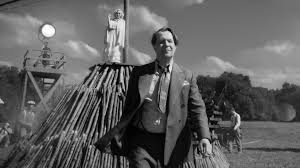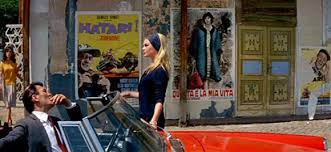Mank
A dour waxworks, Mank, displays the limitations of David Fincher. Like ...Benjamin Button and Zodiac, Mank has impressive production values to denote the period, but no particular period feel. Attempts at witty banter seem leaden whether placed in the Paramount writers' room or San Simeon. The acting is all over the map ranging from the deplorable ( Lily Collins, Sam Troughton, Jamie McShane) to top notch (Amanda Seyfried, Charles Dance, Ferdinand Kingsley), but when Gary Oldman gives an unmemorable performance you know something is wrong. Fincher is a talented technician whose personality makes him best suited to contemporary pictures with dollops of violence and psychopathology. Despite being an obvious labor of love, Mank is outside his ken.
The Joke
 |
| Labor Camp employment in The Joke |
Best of 1961
- Viridiana Luis Buñuel
- The Savage Innocents Nicholas Ray
- Il Posto Ermanno Olmi
- Two Rode Together John Ford
- Underworld USA Sam Fuller
- Through a Glass Darkly Ingmar Bergman
- Last Year at Marienbad Alain Resnais
- La Notte Michelangelo Antonioni
- Breakfast at Tiffany's Blake Edwards
- Armored Command Byron Haskin
Pocketful of Miracles
 |
| Pocketful of Miracles: longer, slower, yet touchingly dated |
Mandy
 |
| Nicholas Cage goes gonzo again in Mandy |
Best of 1962
- The Man Who Shot Liberty Valance John Ford
- Salvatore Giuliano Francesco Rosi
- Vivre Sa Vie Jean-Luc Godard
- The Exterminating Angel Luis Buñuel
- Two Weeks in Another Town Vincente Minnelli
- Advise and Consent Otto Preminger
- Merrill's Marauders Sam Fuller
- L'Eclisse Michelangelo Antonioni
- Mr. Arkadin Orson Welles
- Cleo de 5 a 7 Agnes Varda
Shirkers
Sandi Tan's Shirkers is an intriguing memoir of an abortive film project. Ms. Tan grew up in Singapore where she was an aspiring filmmaker and writer who chafed against the oppressive atmosphere of her island nation. Mentored by a professor, she collaborated with him and a few of her teenage friends on an indie feature one summer when they were all off from school. Unfortunately, her mentor proved to be a sociopath who absconded with the finished reels of film and disappeared into the ether. After his death some twenty years later, Ms. Tan was reunited with the film reels and the colorful footage of that shoot forms the basis of this documentary.
Ms. Tan ably mixes the film footage, behind the scenes shots, present day interviews with the cast and crew and scenes from films that inspired her. Two of her closest friends forged careers in film and their reminiscences share Ms. Tan's enthusiasm for movies and provide interesting counterpoints to Ms. Tan's point of view. The film is crisply edited and never wallows in self-pity or solipsism. Ms. Tan displays a keen visual sense that lifts this documentary above the ordinary. Shirkers is suffused with loss for a past that can't be recaptured, but is ultimately a triumphant exorcism of an artist's demons. (12/14/18)
As of November of 2020, Shirkers can still be seen on Netflix.
The Call of the Wild (2020)
Chris Sanders' The Call of the Wild is a handsome enough production. Janusz Kaminski's cinematography and the production design by Stefan Dechant are particularly fetching. However, the film suffers from Disneyfication. The anamorphic animals look dead-eyed on the CGI canvas. It misses the mythic pull of London's yarn chiefly because it aims to be a theme park with thrill rides.
Best of 1963
- Contempt Jean-Luc Godard
- Shock Corridor Sam Fuller
- Donovan's Reef John Ford
- Judex Georges Franju
- Muriel Alain Resnais
- The Servant Joseph Losey
- The Birds Alfred Hitchcock
- The Silence Ingmar Bergman
- How to Be Loved Wojciech Has
- High and Low Akira Kurosawa
-
Ben Affleck and Matt Damon Joe Carnahan's The Rip is a good meat and potatoes crime film that stars Ben Affleck and Matt Damon and is n...
-
Cillian Murphy I enjoyed the film adaptation of Claire Keegan's novel Small Things Like These more than I expected to, if enjoyment is ...
-
Matt Clark and David Canary I was surprised by how much I enjoyed Dan Curtis' Melvin Purvis: G-Man , a made for television movie that pr...
-
Philip Carey, Gary Cooper, and Guinn 'Big Boy' Williams André De Toth's Springfield Rifle is a very good and under sung Wester...














